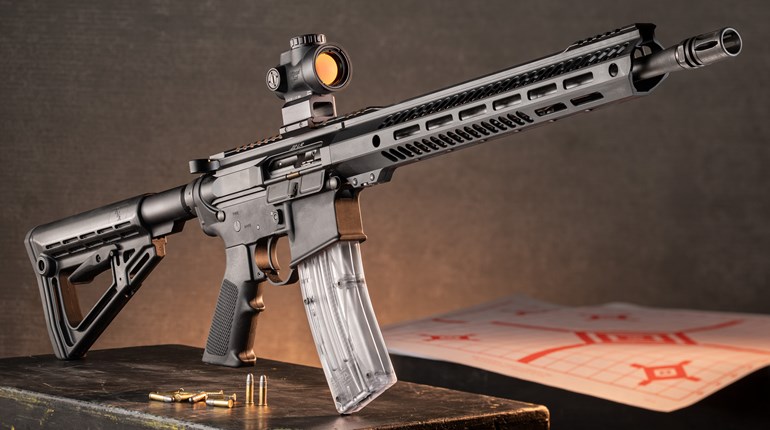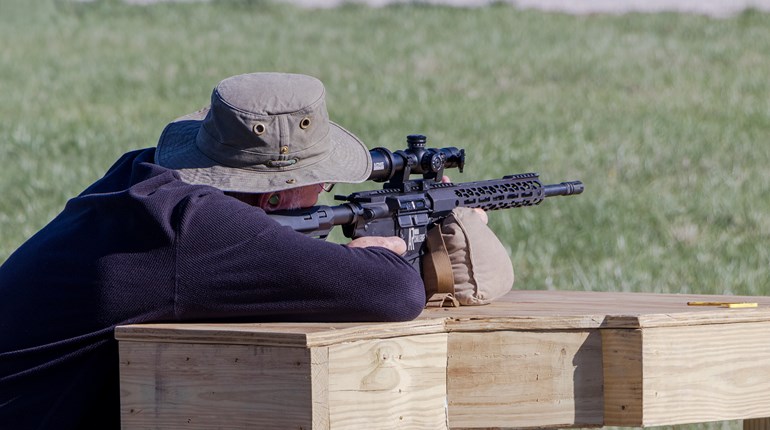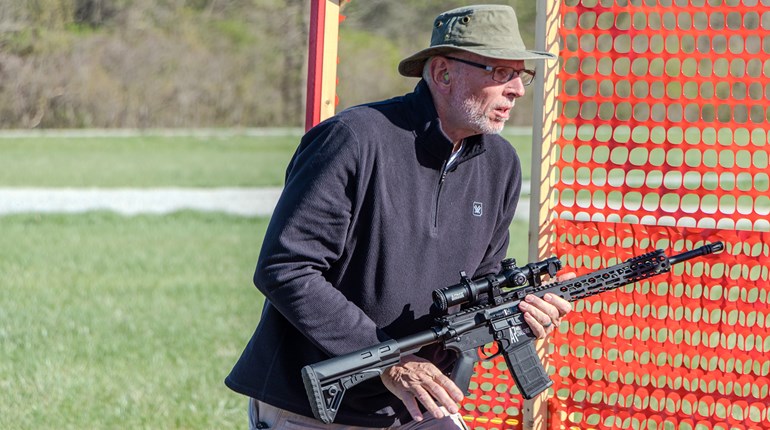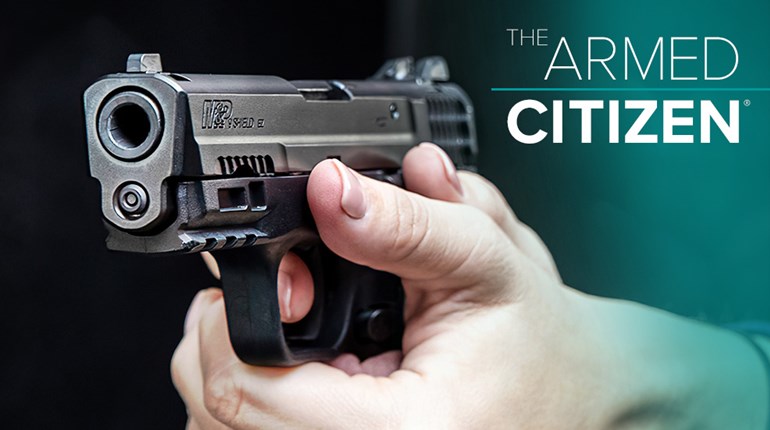
America’s oldest civil rights organization always opposes laws that violate civil rights. For doing so, the NRA has been denounced as a “terrorist organization” by Connecticut Gov. Dan Malloy and other gun prohibitionists. Those are harsh words, but ones that resonate with many among the increasing number of Americans who get all their news from one-sided media.
They wonder: Who can be for “assault weapons”? Why can children who can’t buy a beer buy a rifle? Why shouldn’t there be background checks on all gun sales?
The people who write “Kill NRA” on billboards are the extreme fringe of the tens of millions of Americans who have rarely heard a fair presentation of both sides of the gun debate, and whose “news” might come mainly from comedy shows or Facebook. The Michael Bloomberg gun-ban strategy is to drive a cultural wedge between them and law-abiding gun owners.
“Assault Weapons”
The “assault weapon” issue was brilliantly constructed by gun-ban advocates to take advantage of the ill-informed. Thirty years ago, gun control strategist Josh Sugarmann wrote a report explaining that the press and the public had gotten tired of the handgun ban issue. He urged that prohibitionists concentrate instead on “assault weapons.”
“... anything that looks like a machine gun is assumed to be a machine gun.” —Josh Sugarmann, Violence Policy Center
He offered a key reason why this new type of gun ban would have a good chance politically: “The weapons’ menacing looks, coupled with the public’s confusion over fully automatic machine guns versus semi-automatic assault weapons—anything that looks like a machine gun is assumed to be a machine gun—can only increase the chance of public support for restrictions on these weapons.”
He was correct.
Even today, many people who support bans on so-called “assault weapons” think that they are supporting bans on machine guns. However, “assault weapon” laws do not apply to machine guns. In a machine gun, bullets are fired as long as the user holds down the trigger. In other guns, one trigger press fires one shot—and only one shot.
But as gun banners are well aware, people who know little about guns don’t understand the difference between how a gun looks and how a gun functions.
Today, as in the 1980s, media fakery worsens public confusion. TV news programs discussing “assault weapons” sometimes show video of machine guns firing.
Gun banners and their media allies also tell people that “assault weapons” are much more powerful than other guns. To see how false this is, all you need do is consult any guide to ammunition. For example, the most popular caliber for the AR-15 is .223. According to Cartridges of the World (9th ed.), various versions of .223 ammo have between 965 and 1,460 foot-pounds of energy. Muzzle velocity is between 2,869 and 3,674 feet per second (f.p.s.). Compare that to the .270, a venerable hunting cartridge introduced by Winchester in 1925. Energy in the .270 is between 2,605 and 3,045 foot-pounds—more than double the .223. Velocity of the .270 is comparable to the .223, but the .270 bullet is bigger, hence the .270 is more powerful.
Many other modern center-fire rifle cartridges are also much more powerful than .223, including .243, .30-30, .30-’06 (named for the year of its introduction, 1906), .375, .450, all the rifle magnums, and so on.
But none of this matters to gun-ban groups. The purpose of the “assault weapons” issue is to condition the American public to gun bans. As Washington Post columnist Charles Krauthammer wrote in 1996, praising the 1994 federal “assault weapon” ban, “Its only real justification is not to reduce crime but to desensitize the public to the regulation of weapons in preparation for their ultimate confiscation.” (After the 2008 Heller decision, Krauthammer dropped his support for confiscating all guns.)
There has never been, and cannot be, a stable, coherent definition of “assault weapon.” This is because the bans are not based on the guns’ rate of fire or firepower. Instead, “assault weapon” laws are always about outlawing as many guns as is possible at any given political moment. For example, the 1991 New Jersey “assault weapon” ban included some air guns. An “assault weapon” ban that then-Illinois state Sen. Barack Obama voted for would have outlawed many double-barreled shotguns. Worse, California’s original “assault weapon” ban prohibited a single-shot shotgun.
In 1989, California became the first state to enact an “assault weapon” ban. Since then, the ban has been expanded by the Legislature numerous times. Whenever the Legislature enacts a new, expanded definition, manufacturers comply by producing more firearms that are not classified as “assault weapons.” The gun prohibitionists then complain that by obeying the law, the manufacturers are using “loopholes.” Then additional laws ban more guns, manufacturers comply, prohibitionists demand more prohibition, and the cycle continues.
The NRA is currently in court fighting against the California attorney general’s unilateral attempt to expand the state’s gun ban even further.
At the infamous CNN “town hall” in Florida in February, the angry mob made it clear that they want to ban all semi-automatics. Once that’s accomplished, bans on all pump-action guns are next. The “Million Mom March” already has called for this. The confiscation of pump-action long guns is part of the Australia model that is so beloved by American gun prohibitionists.
Next come bolt-action rifles, which the gun ban lobbies say are “sniper rifles.”
The Bloomberg lobby claims that the “only reason” a person would own an AR-15 (or any other gun that Bloomberg wants to ban) is to murder lots of people quickly. This is a perfect example of how the Bloomberg operation exploits the vulnerabilities of socially isolated individuals.
The AR-15 (ArmaLite model 15) is the most popular rifle in American history. Millions of Americans own one. Obviously, those millions of Americans are not mass murderers. They are the full spectrum of law-abiding citizens from all backgrounds.
But some Americans live in cloistered social circles. They may not know anyone who is “out” about being a gun owner. They believe whatever the media tell them as the media propagate the Bloomberg lies. These socially isolated Americans are easily exploited. Like most opponents of civil rights throughout history, they are enraged because they are gullible consumers of hateful libels.
The Rights Of Young Adults
A century ago, the NRA was an unusual group. As a leading body governing athletic competition, it had no color line. People of all races competed equally in the same events. That was not typical at the time.
A responsible 20-year-old woman who is living on her own would be forbidden to purchase any firearm for her home. No self-defense, and no hunting or target competition.
Back then, most major athletic organizations maintained a color line—either prohibiting participation by people of color, or only allowing racially segregated events. Examples included the American Athletic Union, New York Athletic Club (like the AAU, a leading governor of track and field), horse racing, u.s. Lawn Tennis Association, League of American Wheelmen (bicycle racing), Professional Golf Association, auto racing, professional basketball and professional baseball. Defying the mainstream, the NRA chose to be countercultural, to promote sports and responsibility for all Americans of all races, competing together in the same events.
That commitment never wavered. In the 1950s, the NRA shooting range was one of the few places of public amusement in Washington, D.C., that did not discriminate against people of color. Later, during the Civil Rights movement of the 1950s and 1960s, NRA-affiliated gun clubs would be crucial in arming civil rights advocates for self-defense. Their arms included many .30-cal. m1 carbines (whose standard magazines are 15 or 30 rounds), distributed at discounted prices via the federal Civilian Marksmanship Program.
For the last century, the NRA has fought—usually successfully, in the long run—for the repeal of racist gun control laws that were enacted after the Civil War. Those laws were meant to keep the former slaves and their descendants in de facto servitude.
Today, some persons would destroy the rights of young adults, ages 18 through 20. This is just as wrong as denying civil rights based on a person’s race, religion, sex or sexual orientation.
From early Colonial days to the present, young adults have always had the duty and the right to keep and bear arms. In the Colonial period, militia duty always included 18-year-olds and often reached to 16. The federal militia act of 1792 required males 18 and over to provide themselves with appropriate arms. Today, males who are 18 to 20 years old are required to register for military conscription.
Now, some young adults live with their parents well into their 20s. Others begin living independently in their teens. They all have the fundamental human right of self-defense.
For civil rights, the age of majority has been established at 18. At that age, a person can vote, sign binding legal contracts or enlist in the military (or be drafted) without parental permission. If they are accused of a crime, they will be tried as an adult, not as a juvenile.
It is true that the age for purchasing alcohol and for gambling has been set at 21. A few places do the same for tobacco. Yet these activities—which are considered by some to be vices—are not constitutional rights.
The Federal Gun Control Act of 1968 prevents young adults from buying handguns at retail stores. When the NRA brought a lawsuit against the handgun limit, the 5th Circuit Court of Appeals ruled that the ban on retail handgun sales was acceptable; one reason was because young adults could still obtain handguns from private sales.
But today’s proposals for long gun bans go even further. A responsible 20-year-old woman who is living on her own would be forbidden to purchase any firearm for her home. No self-defense, and no hunting or target competition.
Because of the crime of the Parkland murderer, all law-abiding adults 18 to 20 would be subjected to collective punishment if such laws are passed. They would be stripped of their fundamental human right of self-defense.
Courts were not much help when the racial caste system was being progressively worsened in the late 19th and early 20th centuries. The courts upheld “separate but equal,” even though segregated conditions were rarely equal. They also upheld gun bans and gun licensing laws that were aimed at disarming blacks. When Florida recently passed a new age limit law just before press time for this issue, NRA immediately filed a lawsuit to fight the unconstitutional move.
“Universal” Background Checks
Part of the genius of the Bloomberg gun control system is how it creates prohibitions indirectly. Bloomberg’s so-called “universal” background check scheme is a prime example. These bills are never just about having background checks on the private sales of firearms. That aspect is the part that the public is told about. Yet when you read the Bloomberg laws, you find that checks on private sales are the tip of a very large iceberg of gun prohibition.
... when you read the Bloomberg laws, you find that checks on private sales are the tip of a very large iceberg of gun prohibition.
First, the bills criminalize a vast amount of innocent activity. Suppose you are an nra Certified Instructor teaching an introductory safety class. Under your supervision, students will handle a variety of unloaded firearms. They will learn how different guns have different safeties, and they will learn the safe way to hand a firearm to another person. But thanks to Bloomberg, these classroom firearm lessons are now illegal in Washington state, unless the class takes place at a shooting range.
It’s now also illegal to lend a gun to your friend, so that you can shoot together at a range on your own property. Or to lend a firearm for a week to your neighbor who is being stalked.
Under the Bloomberg system, gun loans are generally forbidden, unless the gun owner and the borrower both go to a gun store first. The store must process the loan as if the store were selling the gun out of its inventory.
Then, when your friend wants to return your gun to you, both of you must go to the gun store again. This time, the store will process that transaction as if you were buying the gun from the store’s inventory. For both the loan and the return of the gun, you will have to pay whatever fees the store charges, and whatever fees the government might charge. The gun store will have to keep a permanent record of you, your friend and the gun, including the gun’s serial number. Depending on the state or city, the government might also keep a permanent record.
In other words, the “background check” law is really a law to expand gun registration—and registration lists are used for confiscation. Consider New York City. In 1967, violent crime in the city was out of control. So the City Council and Mayor John Lindsay required registration of all long guns. The criminals, obviously, did not comply. Thanks to the 1911 Sullivan Act, New York City already had established registration lists for handgun owners.
Then, in 1991, the City Council decided that many lawfully registered firearms were now illegal “assault weapons.” The New York Police Department used the registration lists to ensure that the guns were either surrendered to the government or moved out of the city. When he was mayor of New York City, Bloomberg did the same, after the “assault weapon” law was expanded to cover any rifle or shotgun with an ammunition capacity greater than five rounds.
In Australia and Great Britain—which are often cited as models for the U.S. to follow—registration lists were used for gun confiscation. In Great Britain, this included all handguns; in Australia, handguns over .38 caliber. Both countries banned all semi-automatic or pump-action long guns.
Most American jurisdictions don’t have a comprehensive gun registration system. But even if your state legislature has outlawed gun registration, firearm stores must keep records. Those records could be harvested for future confiscations. Under the Bloomberg system, the store’s list would include not just the guns that the store actually sold, but all the guns (and their owners) that the store processed, for friends or relatives borrowing guns.
If Bloomberg gets his way with his “background check” laws, the next step will be national gun registration. In early 2013, when then-President Obama was pushing hard for gun control, the National Institute of Justice (NIJ, the research arm of the U.S. Department of Justice) evaluated the proposals. Acting Director Greg Ridgeway wrote a memo explaining that a system requiring background checks for gun sales by private individuals is utterly unenforceable without a system of universal gun registration. The same is even more true for Bloomberg’s system of controlling private loans.
So then the gun-ban groups will begin complaining that their “universal” background checks are being stymied by a “loophole”—that the federal government doesn’t have a comprehensive registration list of all guns and all gun owners. Copying Obama’s rhetoric, they won’t use the word “registration.” Instead, they will call it a “national database.”
The NRA didn’t back down when President Bill Clinton, and later Obama, threw the full weight of their presidencies into attacking Second Amendment rights. Likewise, the NRA is not going to surrender to Bloomberg and other malefactors of great wealth. The NRA stands for the civil rights of all Americans.
Dave Kopel is research director at the Independence Institute and a frequent contributor to America’s 1st Freedom magazine.

































